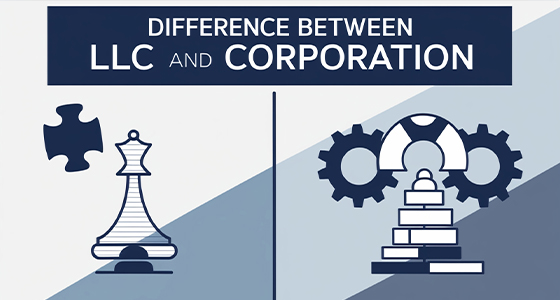Table of Contents
Starting a business often means making big decisions, and one of the first is choosing the right business structure. Two popular options are LLCs (Limited Liability Companies) and Corporations. Both offer legal protection for your personal assets, but they differ in how they operate, are taxed, and fit your business goals. Let’s break it down into simple terms to help you decide.
1. What is an LLC?
An LLC, or Limited Liability Company, is a flexible business structure that combines the simplicity of a sole proprietorship or partnership with the legal protection of a corporation. This means your personal assets (like your home or car) are generally safe if your business faces financial trouble or lawsuits.
Key Features of an LLC:
- Flexibility: You can run your LLC as a single owner (single-member LLC) or with partners (multi-member LLC).
- Pass-Through Taxation: The business income “passes through” to the owners, meaning you pay taxes on your personal tax return, avoiding corporate taxes.
- Less Paperwork: Setting up and running an LLC involves fewer formalities than a corporation.
An LLC is often a great choice for small businesses or startups that want simple operations with legal protection.
2. What is a Corporation?
A corporation is a more structured business type often chosen by larger companies. It’s a separate legal entity, meaning it exists independently of its owners (shareholders).
Key Features of a Corporation:
- Separate Entity: The corporation itself can own property, enter contracts, and pay taxes.
- Shareholders: Corporations have owners (shareholders) who can buy or sell shares, making it easier to raise money.
- Tax Options: Corporations are usually taxed separately from their owners. However, there are two types:
- C-Corporations: Pay corporate taxes on profits.
- S-Corporations: Allow profits to pass through to owners to avoid double taxation.
Corporations are a good fit for businesses planning to grow big or attract investors.
3. Taxes: How Do They Differ?
Taxes are one of the most significant differences between an LLC and a corporation.
- LLC Taxes: By default, LLCs have pass-through taxation, meaning profits are taxed once on the owner’s personal tax return. However, LLCs can choose to be taxed as a corporation if it benefits them.
- Corporation Taxes: Corporations may face double taxation (C-Corp), where the business pays taxes on profits, and owners pay taxes on dividends. S-Corps avoid this by passing income directly to shareholders.
If you want a simple tax setup, an LLC may be better. For complex but potentially beneficial tax options, a corporation could be the way to go.
4. Management Style
- LLCs: You have the freedom to manage the business yourself or appoint managers. There’s no strict requirement for meetings or records.
- Corporations: Require more structure. Corporations must have a board of directors, hold regular meetings, and keep detailed records (called corporate minutes).
If you want less red tape and more control, an LLC might be a better fit.
5. Raising Money
- LLCs: Raising funds can be challenging. You rely on personal savings, loans, or new members joining the LLC.
- Corporations: Corporations can sell shares to investors, making it easier to secure funding, especially for large-scale growth.
If you plan to expand quickly or attract investors, a corporation is likely the better choice.
6. Cost and Ease of Setup
- LLCs: Typically easier and cheaper to set up. You need to file simple documents (like an Operating Agreement).
- Corporations: Involve more paperwork, such as creating bylaws and issuing stock certificates, which can cost more time and money.
7. Which is Right for You?
The best choice depends on your business goals:
- Choose an LLC if: You’re a small business owner or startup seeking legal protection with simplicity and flexibility.
- Choose a Corporation if: You’re planning to grow big, attract investors, or need a highly structured system.
Final Thoughts
Both LLCs and corporations have their pros and cons. Take time to assess your business needs, long-term plans, and how much complexity you’re willing to handle. If you’re unsure, consulting with a business attorney or tax advisor can give you peace of mind.
Choosing the right structure is the first step toward building a successful business!











